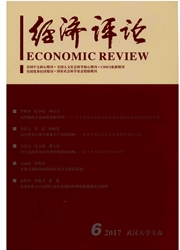

 中文摘要:
中文摘要:
基于中国2000—2013年30个省级面板数据,从劳资议价能力的视角,运用双边随机前沿模型定量估算劳动报酬份额偏离程度。研究结果表明:劳资双方的议价能力具有不对称性.资本方具有更强的议价能力,从而降低劳动报酬份额1.78个百分点;与中西部地区相比,东部地区劳动报酬份额相对于公正基准劳动报酬份额下偏程度更高.这与我国劳动报酬份额处于“U”型下偏阶段的既有结论相契合;影响劳资议价能力的不同因素,在导致劳动报酬份额下偏的作用效应上有所不同。一方面,我们需要重视提高劳动者议价能力进而提高劳动报酬份额,这对于强调内需和消费的经济转型具有积极意义:另一方面,劳动报酬份额提高进而提振内需和消费的作用潜力可能有限,因此强调供给和需求的供给侧结构性改革显得紧迫而必要。
 英文摘要:
英文摘要:
Based on the panel data of 30 provinces of China from 2000 to 2013, from the perspective of bargaining power between labor and capital, this paper uses bilateral stochastic frontier model to estimate the deviation degree of labor income share. The results shows that: Firstly ,both sides have asymmetric bargaining power in negotiation process. Compared with the labor, the capital has a stronger bargaining power, which decreasing the labor income share 1.78 percentage point lower than the equitably fiducial labor income share.Secondly, compared with the developing regions such as the Midwest, the deviation of labor income share in developed regions such as the Eastern is more downward, which is concert with existing research conclusion that Chinese labor income share being in the downward stage of U-type.Thirdly, different factors which affecting the bargaining power will cause different effects in the deviation degree of labor income share.On one hand, we should enhance the bargaining power and the income share of the labor, which are of importance to the economic transformation, underlining the domestic demand and consumption.On the other hand,we must realize that the latent capacity of the domestic demand and consumption by rising labor share is limited, so the Supply- side Structral Reform which stresses both demand and supply is urgent.
 同期刊论文项目
同期刊论文项目
 同项目期刊论文
同项目期刊论文
 期刊信息
期刊信息
